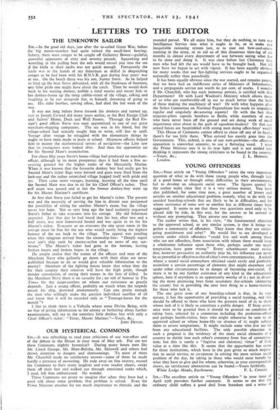YOUNG OFFENDERS
Sta,—Your article on "Young Offenders" raises the very important question of what to do with those young people who, through lack of a good home or through other difficulties in their environment, fail to develop an adequate social sense. The figures quoted by the author make clear that it is a very serious matter. You have also published, for some time now, a great number of letters and articles on another educational problem, namely, what to do with the unaided boarding-schools that are likely to be in difficulties, and for whom assistance of some sort or another has at different times been suggested. It seems to me that these two questions need only to be placed side by side, in this way, for the answer to be arrived at without any prompting. They answer one another.
The author writes that, in his view, "the fundamental objection to the approved school, or any similar system, is that it brings to- gether a community of offenders. They know that they are under- going punishment and rebel." He would like to see developed a system under which offenders "could live and work among those who are not offenders, from association with whom there would issue a wholesome influence upon those who, perhaps under too much temptation, have gone wrong." Every schoolmaster must realise that, however persuasive an authority may be, his influence can never be so powerful or effective as that of a boy's own contemporaries. A school where a sound social atmosphere obtained could easily and profitably assimilate a certain percentage of elements that might elsewhere and under other circumstances be in danger of becoming anti-social. If there is to be any further assistance of any kind in the educational sphere, here if anywhere is an opportunity worthy of it ; not in divert- ing the more promising boys from secondary day-schools (skimming the cream) but in providing the next best thing to a home-training for those who lack it.
The one great asset of any boarding-school is that, in its very nature, it hat the opportunity of providing a social training, And this should be offered to those who have the greatest need of it; to those whose lack of it is likely to constitute a public danger. If State assist- ance were to be granted then it should be granted on condition of taking boys, selected by a committee including the probation-officer and perhaps health-visitor, boys who might otherwise be sent to an approved school or whose home-life (or absence of it) might subject them to severe temptations. It might include some who live too far from any educational facilities. The only possible objection to such a proposal is the tendency of the more social elements of a country to shrink into each other's company from fear of contamina- tion; but this is surely a "fugitive and cloistered virtue" of little value at a time like this. It seems that the opportunity has come for those institutions, which have in the past given so niuch inspira- tion to social service, to co-operate in solving the most serious social problem of the day, by taking in those who would most benefit by what they have to give and for whom, otherwise, as your correspondent shows, no satisfactory alternatives can be found.—Yours faithfully,






























 Previous page
Previous page